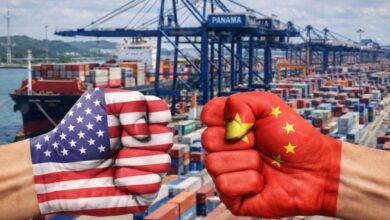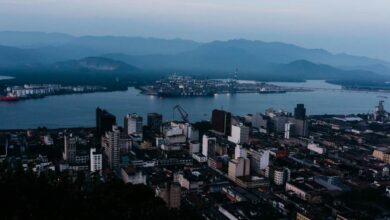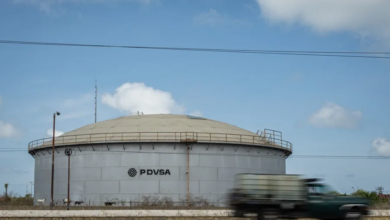Trump’s setbacks and other news of the week
Trump's setbacks in the high court and a controversy over a former drug trafficker released from prison are some news that took the front page this week.

We tell you what are the most relevant news this week. / Photos: flickr.com/whitehouse, U.S. state of Florida, Wikimedia – Fabio Rodrigues Pozzebom / ABr
LatinAmerican Post | Juliana Suárez
Listen to this article
Leer en español: Los reveses de Trump y otras noticias de la semana
COVID-19 sprouts
Some countries that have already returned to normal have had to stop and go back to prevent the coronavirus from expanding again. China is one of those who already saw cases again after dozens of new infections were found in the traditional market of Beijing. After several days of the first signs of a flare-up, more than 100 cases have been reported in the city. After this, the municipal authorities have reactivated some restrictive measures to prevent it from spreading in the city and, even more, from spreading to other parts of the country. Among them, they canceled all outgoing and incoming flights to Beijing, as well as the overland passage from Beijing to other cities.
Likewise, New Zealand, whose response to the pandemic has been praised, found two new cases of coronavirus. Two British women who came within the exceptions that were given to be able to travel to the country. Prime Minister Jacinda Ardern described what happened as an unacceptable failure in the control system. To this, she announced the appointment of a Defense chief-assistant and also requested following another 320 people who had contact with the two cases to be tested.
Carlos Lehder released
After 33 years in a United States prison, the Colombian-German extraditable, Carlos Lehder, arrived in Germany after the latter requested it and was released. In Germany, he was accepted by an organization as a humanitarian gesture and will not have any legal process since his sentence is considered accomplished in the USA.
Lehder was one of Pablo Escobar's partners in the Medellín Cartel and was extradited to the United States since 1987, serving a 134-year first sentence. However, after cooperating with the authorities in testifying against the former Panamanian dictator Manuel Antonio Noriega, he was taken into a witness protection program and his sentence was reduced.
According to El Tiempo, Lehder's lawyer, Óscar Arroyave, said that "it was Lehder himself who asked to be sent to Germany – where his father was from – and not to Colombia, where his father had come at the beginning of the last century." The request to send him to the European country was made within the framework of a diplomatic agreement for the exchange of prisoners.
Also read: North Korean attacked a South Korean office
Likewise, despite the fact that in the past the Colombian government had requested that after serving his sentence in the United States he was extradited back to Colombia, this time he did not "oppose" or express any outstanding debt in the country, so he was able to reach Germany. Despite these claims by the lawyer, the Colombian embassy in the United States said it had not been notified.
Trump loses in the High Court
The US Supreme Court made two important civil rights decisions that present a setback for Trump, his policies, and his priorities.
First, it ruled that people in the LGBTIQ + community cannot be fired from their jobs because of their sexual orientation or gender identity. The Court's ruling is a historical fact because this did not happen yet in more than half of the states of that country and the Civil Rights Act of 1964, which prohibits labor discrimination against men or women, did not include discrimination based on sexual orientation nor gender identity. In the past, Trump had insisted that the law only referred to men and women and the LGBT + community could not be included and the decision was reached even though the court is mostly conservative.
The second important decision of the Supreme Court was related to the "dreamers", young undocumented migrants who since the beginning of his presidency Trump intended to deport. The Court has decided to protect the program they were sheltered in before the arrival of Trump, the Deferred Action for Childhood Arrivals (DACA) program. The ruling concluded that the president had not followed the mechanisms of the law to dismantle the program when he did so in 2017. Trump referred to the decision as "horrible" and urged Americans to vote for him in the November elections to reverse this and change the judges of the High Court.
Do you get the impression that the Supreme Court doesn’t like me?
— Donald J. Trump (@realDonaldTrump) June 18, 2020
"Hunger pandemic" in Latin America
The UN warned of a "hunger pandemic" in the region as a consequence of the coronavirus pandemic. According to the UN World Food Program (WFP), in 11 countries in the region, at least 14 million will suffer from "severe food insecurity" as a result of the virus, one reason being the high percentage of informal workers, added to the droughts of 2019 in some countries. In addition, if those with "moderate food insecurity" are included, the number could reach 40 million.
The will live with the effects of the #COVID19 pandemic for years to come.
The crisis affects every community it touches, but it's the poorest and most vulnerable who will pay the highest price.
You can help
— World Food Programme (@WFP) June 11, 2020
Taking into account that "with the largest drop in regional GDP in a century, estimated at -5.3%, approximately 16 million Latin Americans will fall into extreme poverty, " according to the UN, both organizations and governments must focus their actions on Parallel way to control the spread of the coronavirus and avoid this type of consequences.
Also read: COVID-19 will affect the food and financial security of many for years to come
According to Miguel Barreto, WFP director for Latin America and the Caribbean, the program needed $ 400 million to help the region during 2020, but financial aid is very low. For this reason, and given the aggravating nature of the pandemic, the UN has proposed the creation of a "hunger bonus". The bond "could materialize in the form of cash transfers, baskets or food stamps to the entire population in extreme poverty for a period of six months," the UN said in its report .
Sanctions for Bashar al-Assad
The US government announced a new campaign against the Syrian Bashar al-Assad regime as a way to exert economic and political pressure. In the statement, Mike Pompeo, secretary of state, stated that the Syrian president and his wife will be punished and included in the list of 37 other people who do business with them. He warned that anyone doing business with the Bashar al-Assad regime will be exposed to financial sanctions and travel restrictions.
Today we begin a sustained campaign of sanctions against the Assad regime under the Caesar Act, which authorizes severe economic sanctions to hold the Assad regime and its foreign enablers accountable for their brutal acts against the Syrian people.
— Secretary Pompeo (@SecPompeo) June 17, 2020
The 39 people on the list, many of whom are family members of al-Assad, will have any of their assets in the United States frozen. According to the US government, some of the people or organizations on the list are there for having played "a key role in preventing a peaceful political solution to the conflict," and others because they "helped and financed the atrocities of the al-Assad. "




